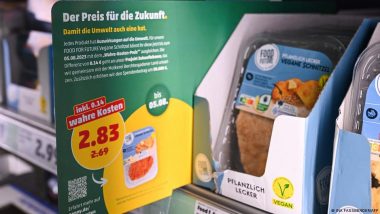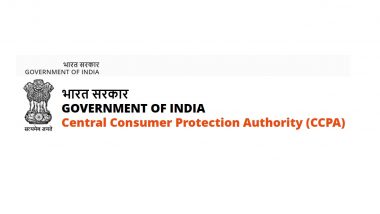The discount supermarket chain Penny is selling nine products for a price that reflects their impact on the environment. They are now significantly more expensive. But what impact will the campaign have?Almost all of the products that the German discount supermarket Penny is now selling at the "true cost" of their environmental impacts are markedly more expensive. The organic fruit yogurt costs 31% more; the conventionally produced Maasdam cheese is almost twice as expensive. Only the vegan schnitzel is almost the same price, up just 5%, or 14 cents.
Also Read | World News | Senate Office Buildings Locked Down over Reports of Gunman.
Penny's "True Cost" campaign is meant to show what the items would cost if all of the environmental and climate consequences of production were taken into account, from the impacts on nature to the emissions of particulate matter and greenhouse gases such as methane and CO2 to the use of resources, fertilizers and pesticides.
Also Read | Health News | Researchers Finds Mechanism That Minimises Liver Injury During Transplantation.
"These impacts are not yet reflected in sales prices, but they cost our society money indirectly," say scientists from the Nuremberg Institute of Technology and the University of Greifswald in northern Germany, who are supporting the Penny campaign and calculated the environmental costs of the nine products.
For example, greenhouse gases drive climate change and therefore extreme weather, "for which the damage we all pay through higher taxes or insurance costs." Another example is the cost of treating drinking water, which can be contaminated by fertilizers. As well as climate and water, damage to soil and health impacts were also taken into account.
Penny's 'uncomfortable message'
The environmental organization Greenpeace estimates the cost of environmental and climate damage from meat and milk production in Germany to be as high as €6 billion a year. True costs increase with meat and dairy products, said Amelie Michalke, who is researching sustainability as a postdoc at the University of Greifswald. The hidden costs are often almost marginal for plant-based products , she said.
According to Penny, organic products have an average true cost that is €1.15 higher than their price tags; the average difference is €1.57 for conventional products.
According to its company statements, the REWE Group-owned Penny aims to increase environmental awareness of the impact of food production, as it did as part of a similar previous campaign back in 2020. The difference between the "true cost" and the usual selling price of the nine products will be used to finance projects for climate protection and the preservation of family-run farms in the Alps.
Penny does not assume that many people will buy the more expensive products. "We expect a drop in sales in the single-digit-million range," Penny COO Stefan Görgens said. Many people are already struggling with the current high grocery prices. But, Görgens said, if no action is taken, the long-term costs will be significantly higher, an "uncomfortable message" that must be faced.
A 'greenwashing project'?
The consumer protection organization Foodwatch called the campaign a "pure PR stunt." While Penny is charging the "true cost" of the nine products, the chain continues to push down prices on a number of other products that are bad for the environment, such as meat, according to Foodwatch.
Bernhard Krüsken, the general secretary of the German Farmers' Association, called the campaign a "greenwashing project of a discount supermarket that otherwise has little interest in fair pricing."
Penny spokesman Andreas Krämer does not want the campaign to be seen as a pure PR tool. It is important for companies to develop a position regarding environmental issues, Krämer told DW. "We know that sustainability is also expected in the discount sector," he said.
The REWE Group does not deny that other products are priced significantly more cheaply, even during the "True Cost" campaign. Krämer said that was the result of production surpluses. He added that Penny does not pressure suppliers and has little influence on the pricing of distributors or production.
Seeking government intervention
Greenpeace and Friends of the Earth Germany have praised the "True Cost" initiative in principle. However, "the action must finally be followed by fundamental measures," Greenpeace press officer Matthias Lambrecht said. "The supermarket chains are just as responsible as the federal government."
Policies that could be put in place by the government include abolishing value-added taxes on plant-based foods. VAT on meat and dairy products could be increased to encourage a change in consumption habits.
Friends of the Earth and the Federation of German Consumer Organisations also advocate a change in VAT. However, price increases would have to be measured, particularly for people with lower financial means, according to the organizations.
German Food and Agriculture Minister Cem Özdemir, of the Greens, has often brought up the idea of controlling consumption through prices. But, in May, German Chancellor Olaf Scholz rejected Özdemir's ideas for no VAT on fruits, vegetables and legumes. The chancellor said "the state's cash position" meant that Germany was not financially able to discuss many VAT reductions for now.
Customers are not enthusiastic about spending more money on groceries, according to a YouGov poll at the start of Penny's campaign. Only 16% of people surveyed said they planned to buy the more expensive products at Penny. Only 8% of people 55 and older said they would.
The reactions of consumers are also part of the experiment, said environmental economist Tobias Gaugler, from the Nuremberg Institute of Technology. If hardly anyone is willing to pay the higher prices, Gaugler said, other means would have to be found to "reduce the current mispricing in retail."
This article was originally published in German.
(The above story first appeared on LatestLY on Aug 03, 2023 12:50 AM IST. For more news and updates on politics, world, sports, entertainment and lifestyle, log on to our website latestly.com).













 Quickly
Quickly



















